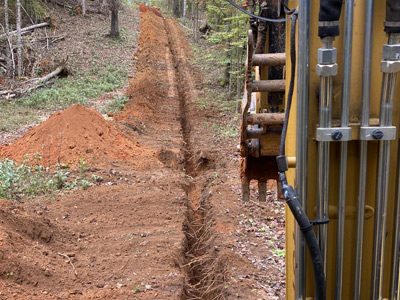Top 5 Excavation Applications
 A professional excavation contractor evaluates the job and determines the appropriate tools and methodology. When building a structure, laying a road or bridge, or laying pipes and wires underground, the movement of dirt, rock, and other heavy materials is a need. In addition to our other site development and utilities services, Gibbs Excavating & Grading provides excavation services for commercial and residential customers.
A professional excavation contractor evaluates the job and determines the appropriate tools and methodology. When building a structure, laying a road or bridge, or laying pipes and wires underground, the movement of dirt, rock, and other heavy materials is a need. In addition to our other site development and utilities services, Gibbs Excavating & Grading provides excavation services for commercial and residential customers.
There are different types of excavation applications, and here is a look at them:
Foundation Excavation
A foundation excavation involves digging as far as is required for the specific type of job at hand to remove dirt from under the surface. Foundations for buildings, bridges, and other structures, drainage ditches, embankments, and installing pipes and other underground services all need this sort of excavation. Footing excavation is a subset of foundation excavation that aims to produce a stable base for a structure. The process includes mixing and placing concrete.
Road Excavation
Excavation is often performed to pave the way for roads, highways, and freeways, with the excavated materials, then being used to construct embankments and other infrastructure. Expanding a road might be as simple as completing a concrete shoulder or turn lane or as extensive as adding more lanes to an interstate. Extensive excavation is usually necessary to lay down aggregate foundations and lifts of either asphalt or concrete when a road is widened.
Pool Excavation
To find out what kind of soil you're working with, you may get it tested. The circumstances in which you excavate your pool might be affected by things like salts, organic waste, clay, sand, gravel, and silt. The next step is to send in the big machines, such as a backhoe, to begin excavating. An excavation crew will dig, shape, and finish your pool by hand to exacting standards based on your blueprints. While excavation typically takes only a single day, it might take longer due to poor soil or inclement weather.
Septic Tank Excavation
Soil testing is the first step in the septic tank installation procedure. The inspection aims to identify any issues with your current water waste system and recommend improvements. The specialist can then use that data to determine how well the soil drains. When the contractor starts digging, they'll do it per your unique plan.
Using gravity to carry water from the home to the tank is the primary factor determining the depth. A minimum slope of two percent from the building to the storage tank is required by most codes. In addition, the laws mandate that the tank be covered with at least six inches of dirt. Drain field trench excavation will take place later.
Drainage Excavation
Drainage excavation removes soil, rock, and other materials to create a drain, ditch, trench, or other depression for runoff to divert water away from a target region. Drainage excavation redirects water away from these areas to prevent floods from damaging roads, residences, and other infrastructure.
While using advanced site excavation equipment is vital, you need skilled, trained, and reliable technicians to handle and complete the job methodically and safely. Regardless of the type of excavation services you need, feel free to call the Gibbs Excavating & Grading team at 615-419-2457. You can also send us a message via this Online Form, and we will call you back to discuss the excavation project details and specifications.

 A
A 